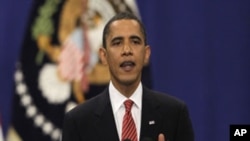In announcing a new Afghan strategy, President Obama hopes to eventually bring to a close a low-level conflict that has been going on for eight years. The shift in strategy is largely due to changes in those intervening years in all of the countries involved in one way or another in the Afghan conflict and its fallout. There is hope, but also skepticism about U.S. plans in Afghanistan and the region.
Afghan Ambassador to the United States Said Jawad tells VOA Afghans would have preferred not to hear of any potential exit date for U.S. forces from his country. His countrymen feel they were abandoned once before by the United States after Soviet troops were ousted from Afghanistan in 1989.
But Ambassador Jawad says he understands the domestic political pressures on President Obama. "As far as the Afghan people are concerned it probably would have been a better option (to omit the date). But one has to be realistic. There is an economic crisis here in the U.S., the Iraq war, eight years of U.S. engagement in Afghanistan, put a lot of pressure on President Obama to indicate how long this engagement will last in Afghanistan," he said.
President Obama will deploy 30,000 additional troops to Afghanistan with the twin goals of containing the Taliban resurgence and training Afghan security forces to the point of self-reliance. By next year U.S. troop levels will be around 100,000.
If all goes to plan, President Obama would like to begin phasing the U.S. troops out beginning in mid-2011. As the president intimated in his speech, a set timeframe puts pressure on the government of President Hamid Karzai to take responsibility for Afghan security.
Georgetown University Professor Christine Fair has long experience in South Asia. She says the date also pushes President Karzai - who won a second term through a tainted re-election - to clean up widespread corruption. "The withdrawal date puts pressure on Karzai. We are not going to be here forever. You have an expiration date if you do not clean up your act," he said.
The U.S. commander in Afghanistan, General Stanley McChrystal, had asked for 40,000 troops. President Obama says he is asking for and expects additional force commitments from NATO allies.
But Francesc Vendrell, former E.U. Special Representative to Afghanistan, believes the president will have trouble gaining those additional commitments from countries where there is already considerable skepticism about the U.S. war effort in Afghanistan.
Vendrell adds some countries will send troops that will be barred from any combat role. "He may pick up some, but some of these countries are not going to be willing to be engaged in the real fight. If you have 100,000 American soldiers, an increase of a few thousands from a variety of foreign countries is not going to make much difference," he said.
President Obama said the United States is also committed to building a new partnership with Pakistan, where the Taliban and al-Qaida have established safe havens in lawless border regions. He offered no details, which Fair says was disappointing. "I think he made a number of, I don't want to dismiss them as platitudinous, statements about the importance of Pakistan. But I do not think he was as strong as he needed to be on Pakistan. It was not very clear about what we will do in the event that Pakistan does not stop supporting the Afghan Taliban. So I think that on the issue of Pakistan, which is absolutely pivotal, I was expecting him - I should not say I was expecting him - I was hopeful that he would be maybe a little bit more bold and assertive," she said.
Afghan Ambassador Jawad says he was pleased to hear President Obama address the issue of Pakistani sanctuaries, even obliquely. "I think that the president made it very clear that those extremist elements whose locations are known and whose intentions are clear should be dealt with in a decisive way. I particularly like this part of the speech and I know what he is referring to," he said.
But Pakistani officials have voiced concern a U.S. troop increase in Afghanistan will force more Taliban militants back to their side of the border. Pakistan insists it is trying to wipe out the sanctuaries, and Ambassador Jawad admits the Pakistani government and, more importantly, its military are now moving to deal with the issue.
News
New US Afghan Strategy Raises Questions
update

Analysts say there is hope, but also skepticism about President Obama's new strategy in Afghanistan and region



